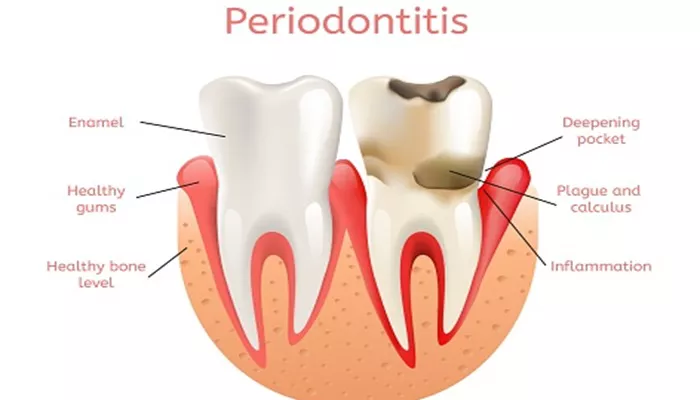Periodontal disease, commonly known as gum disease, is a significant oral health concern that affects millions of people globally. Characterized by inflammation and infection of the gums, this condition can lead to severe complications, including tooth loss and systemic health issues. This article explores whether periodontal disease is a lifelong condition, the stages of the disease, its implications, and strategies for management.
What Is Periodontal Disease?
Periodontal disease begins as gingivitis, a mild form of gum disease characterized by swollen and bleeding gums. If left untreated, gingivitis can progress to more severe forms of periodontal disease, which can cause irreversible damage to the supporting structures of the teeth.
The primary cause of periodontal disease is the accumulation of plaque—a sticky film of bacteria that forms on teeth. When plaque is not adequately removed through brushing and flossing, it hardens into tartar, leading to inflammation and infection.
Stages of Periodontal Disease
Understanding the stages of periodontal disease is crucial for recognizing its potential impact on dental health:
Gingivitis:
Symptoms: Red, swollen gums that bleed during brushing or flossing.
Reversibility: Gingivitis is entirely reversible with proper oral hygiene and professional dental care.
Early Periodontitis:
Symptoms: Formation of periodontal pockets (4-5 mm) between gums and teeth; possible bone loss.
Reversibility: Damage begins to become irreversible; however, with treatment, progression can be halted.
SEE ALSO: What Is The Most Common Gum Disease?
Moderate Periodontitis:
Symptoms: Increased pocket depth (5-7 mm), gum recession, and tooth mobility.
Reversibility: Significant damage occurs; treatment focuses on managing symptoms and preventing further loss.
Advanced Periodontitis:
Symptoms: Severe bone loss, deep pockets (greater than 7 mm), loose teeth, and potential tooth loss.
Reversibility: At this stage, periodontal disease is considered irreversible. Management focuses on maintaining dental health and preventing further complications.
Will Periodontal Disease Last A Lifetime?
The short answer is yes; periodontal disease can be a lifelong condition if not properly managed. Once it progresses beyond gingivitis, the damage caused by periodontal disease cannot be completely reversed due to irreversible bone loss and tissue destruction. However, this does not mean that individuals with periodontal disease will inevitably lose their teeth.
Key Findings from Research
Longitudinal Studies:
A study conducted in 1978 involving 600 individuals with periodontal disease revealed that approximately 50% did not lose any teeth over a 22-year period despite having the condition.
A more recent study from 2003 found that only 61 out of 156 patients experienced tooth loss during a 12-year follow-up.
Factors Influencing Tooth Retention:
Consistent oral hygiene practices, regular dental check-ups, and timely interventions play critical roles in managing periodontal disease.
Patients who maintain good oral health habits can keep their teeth for a lifetime despite having periodontal disease.
Risk Factors for Tooth Loss
Several factors contribute to the risk of tooth loss in individuals with periodontal disease:
Age: Older adults are more likely to experience tooth loss due to cumulative effects over time.
Smoking: Tobacco use significantly increases the risk of developing periodontal disease and exacerbates its severity.
Diabetes: Individuals with diabetes are at higher risk for gum infections due to compromised immune function.
Genetics: Family history may influence susceptibility to periodontal diseases.
Poor Oral Hygiene: Inadequate brushing and flossing allow plaque buildup, leading to gum inflammation.
Managing Periodontal Disease
While periodontal disease cannot be cured once it has progressed beyond gingivitis, effective management strategies can help control its progression:
Professional Treatments
Scaling and Root Planing:
A deep cleaning procedure that removes plaque and tartar from below the gum line.
Antibiotic Therapy:
Topical or oral antibiotics may be prescribed to control bacterial infections.
Surgical Interventions:
In advanced cases, surgical procedures such as flap surgery or bone grafts may be necessary to restore lost tissue and bone.
At-Home Care
Daily Oral Hygiene:
Brushing twice daily with fluoride toothpaste and flossing daily are essential for removing plaque.
Regular Dental Visits:
Routine check-ups every six months allow for early detection and management of potential issues.
Healthy Lifestyle Choices:
A balanced diet rich in vitamins and minerals supports overall oral health. Avoiding tobacco products also significantly reduces risk factors associated with periodontal disease.
Conclusion
In summary, while periodontal disease can last a lifetime if not properly managed, it does not necessarily lead to inevitable tooth loss for all individuals affected by it. With diligent oral hygiene practices, regular dental care, and appropriate treatments, many people can maintain their dental health despite having this chronic condition.
Related topics:

